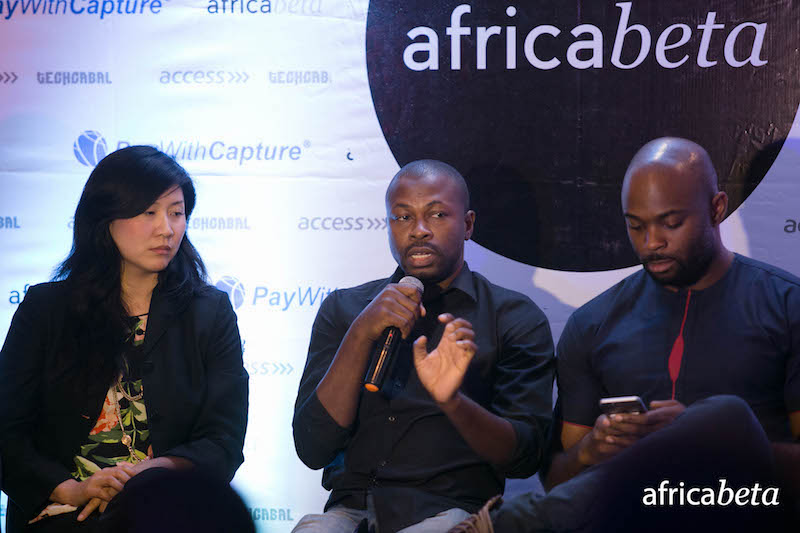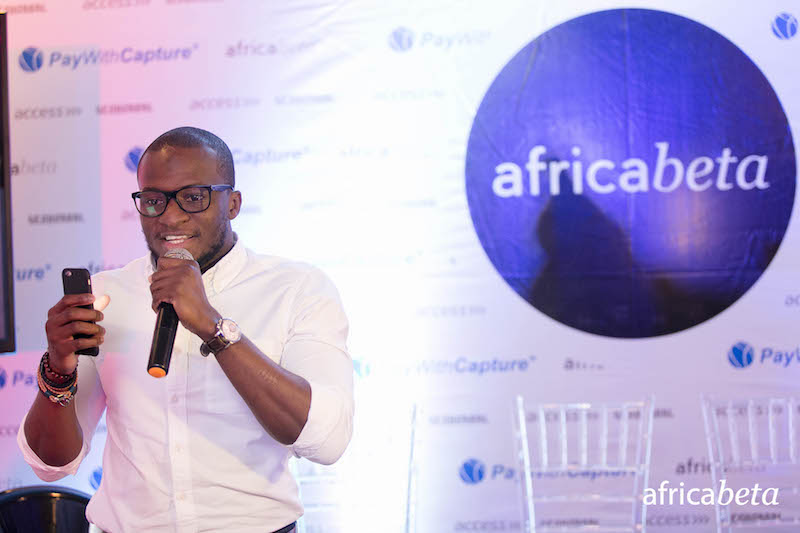Fixing Nigerian payments. This was the focus of the conversation, at Africabeta 2.0, which held on Saturday, January 30, 2016, at The Social Place, in Victoria Island, Lagos. Payments service providers, online merchants, developers, and other technology enthusiasts in Nigeria, came in droves to be a part of the discussion.
To kick things off, Bankole Oluwafemi, Editor-in-chief of TechCabal welcomed the guests and set the tone of the conversation. He described his experience from a consumer perspective – making payments for goods and services in Nigeria, is a more tedious task than it should be.
To discuss solutions, the event was divided into two panels; the Merchants panel, and the Payment Experts panel.
The Merchants
With Callbase CEO, Oo Nwoye, as moderator, the merchants panel comprised of Printivo CEO, Oluyomi Ojo, Honey Ogundeyi, founder of Fashpa, Emeka Mordi, COO of Spinlet, and the CEO of logistics company, Max.ng, Chinedu Azodoh.
On the #africaBeta merchants panel, @OoTheNigerian, @OluyomiOjo, @HoneyOgundeyi, @modkilla and @chineduazodoh pic.twitter.com/U9Z1OSTRXk
— TechCabal👨🏾🚀 (@TechCabal) January 30, 2016
The merchants described their experiences over the years, running e-commerce businesses in Nigeria, and even though they operate in disparate industries, they shared an aversion to the payment-on-delivery option.
Consumers’ preference for the payment-on-delivery option in Nigeria, is born out of a place of distrust for the system. Understandably so, as with almost everything in the country.
How will you like to pay? #africabeta
— Techpoint Africa (@TechpointAfrica) January 30, 2016
No one can tell, whether your innocent attempt to purchase a pair of Skullcandy headphones will culminate in you getting Skallcondy cans, complete with the pilot microphones, you never knew Skullcandy made. No one can tell, what your chances of a refund are, if you aren’t satisfied with your purchase, or if, while making the payment, you hit a snag that leaves your hard earned cash in limbo.
While the most convenient option for the skeptical consumer, it’s easy to see how the payment-on-delivery paradigm is bad for business. Imagine having to transport a dress from Lagos to Enugu, only to be told that the customer “prefers the navy blue, rather than the black one, you sent”. Or imagine the risk involved, in entrusting delivery men with large sums of cash. Logistical nightmare.
During the Q&A session, Iyin Aboyeji, from Andela, asked, “It’s not enough for us to throw hands in the air, and wait for things to get better. What are you doing, to make the payment experience a better one, for your customers?”.
“When the customer gets past a certain stage in the order process, if they leave the site without completing the transaction, we go after them, find out if they had any issues, and offer alternative payment methods,” answered Oluyomi Ojo, “and if you receive your order, and do not like it, we will take it from you, and give you a reprint, at no extra cost.”
Emeka Mordi, humorously added, that Spinlet cannot offer music via cash-on-delivery, but that they accept a wide range of payment mediums, even with airtime, from all Nigerian networks.
In the end, it was agreed that seamless transactions – as enabled by service providers – will drive up consumer confidence, which will in turn keep payment-on-delivery to a minimum.
The Experts
Next up was the online payments service providers panel. We had Oo Nwoye as moderator again, Joyce Kim from Stellar.org, Ope Adeoye from Interswitch, and JR Kanu, from Konga Pay.
Our experts panel: @OoTheNigerian, @joyce from @StellarOrg, @opeadeoye from @InterswitchGRP, @jr_kanu from @KongaPay pic.twitter.com/0JOOuiuW7W
— TechCabal👨🏾🚀 (@TechCabal) January 30, 2016
One of the main takeaways from the Experts panel, was that the e-commerce is still nascent in Nigeria, and the total addressable market is miniscule, compared to it’s potential size.
"There are 200,000 active cards in Nigeria, as opposed to 97 million internet users." – @opeadeoye pic.twitter.com/tXOrqzfD89
— TechCabal👨🏾🚀 (@TechCabal) January 30, 2016
Ope Adeoye, from Interswitch said, “to close the gap between the 200,000 active cards, and the 97 million mobile internet users, merchants need to collaborate”. There is no reason why an e-commerce company cannot link to another that provides adjacent or complementary services.
A big part of bringing more purchase intent online, is educating customers, while providing as seamless, an experience as possible and in the process, cultivating trust in the electronic payments system. This, in turn, becomes the gateway drug, to e-commerce.
There was also talk about online payments, on a policy level. The larger payments service providers, have earned a seat at the financial policy table, and they can use that platform, to drive for more merchant-centric conversation, effectively becoming the bridge between merchants, and CBN/finance committees.
And even if they cannot get the merchants in the room when these policy conversations are taking place, they can help drive dialogue between the merchants, and the custodians of the public funds merchants are trying to garner – the banks.
PayWithCapture
AfricaBeta 2.0 was sponsored by Access Bank, and PayWithCapture, and to round up the event, the CEO of PayWithCapture, Ife Orioke came to give a presentation, about his payments platform. Ife highlighted that the customer was at the center of the PayWithCapture experience.
He finished his presentation with a demo of the PayWithCapture app.
You can find more pictures from the event, on our Facebook page.

































